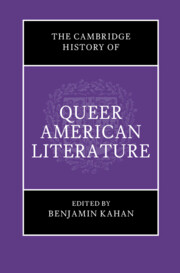Book contents
- The Cambridge History of Queer American Literature
- The Cambridge History of Queer American Literature
- Copyright page
- Contents
- Figures
- Tables
- Contributors
- Acknowledgments
- Introduction
- Part I Synchronic Histories of American Sexuality
- The Sexuality of American History
- Queer Literary Movements
- 9 Trans-ing Transcendentalism
- 10 Sentimental Literature and the Erotics of Identification
- 11 Queer Modernism and Misfit Identity
- 12 Imperialism and the Queer Harlem Renaissance
- 13 The Mystical Sexuality of the Beats and the Berkeley Renaissance
- 14 The New York School’s Queer Happiness
- 15 Chicana and Latina Lesbian Feminists and the Radical Making of Anthological Archives of Willfulness
- 16 Queer Literature after Queer Theory
- Part II Diachronic Histories of American Sexuality
- Part III Queer Methods
- Index
16 - Queer Literature after Queer Theory
from Queer Literary Movements
Published online by Cambridge University Press: 17 May 2024
- The Cambridge History of Queer American Literature
- The Cambridge History of Queer American Literature
- Copyright page
- Contents
- Figures
- Tables
- Contributors
- Acknowledgments
- Introduction
- Part I Synchronic Histories of American Sexuality
- The Sexuality of American History
- Queer Literary Movements
- 9 Trans-ing Transcendentalism
- 10 Sentimental Literature and the Erotics of Identification
- 11 Queer Modernism and Misfit Identity
- 12 Imperialism and the Queer Harlem Renaissance
- 13 The Mystical Sexuality of the Beats and the Berkeley Renaissance
- 14 The New York School’s Queer Happiness
- 15 Chicana and Latina Lesbian Feminists and the Radical Making of Anthological Archives of Willfulness
- 16 Queer Literature after Queer Theory
- Part II Diachronic Histories of American Sexuality
- Part III Queer Methods
- Index
Summary
Leaning against the affordances of narratological clarity that the rhetoric of afterness sometimes seems to promise—a spatiotemporal legibility complicated in the queer poetics of John Ashbery and Harryette Mullen—this chapter returns to Eve Kosofsky Sedgwick’s formulation of reparative reading as it first appears in her introduction to Novel-Gazing (rather than its later form in Touching Feeling) for its illumination of a mode of relational attention, inseparable from the latter’s quality of effort, that Sedgwick figures in terms of the experimental spirit of the palpable. Both echoing William James’s characterization of the “strain and squeeze” of tendency and echoed in Lauren Berlant and Kathleen Stewart’s articulation of a horizon of the palpable as sidelong “tendency dilating,” the haptic absorptions of Sedgwick’s vision of reading invite us to shift our attention to a textual substance whose complex responsiveness interrupts the perceptual ease of object relations. Brian Teare’s Pleasure and Maggie Nelson’s The Argonauts offer instances of such textual ecologies turned in on and against themselves, giving productive pause to the hand of the eye.
Keywords
- Type
- Chapter
- Information
- The Cambridge History of Queer American Literature , pp. 281 - 296Publisher: Cambridge University PressPrint publication year: 2024

